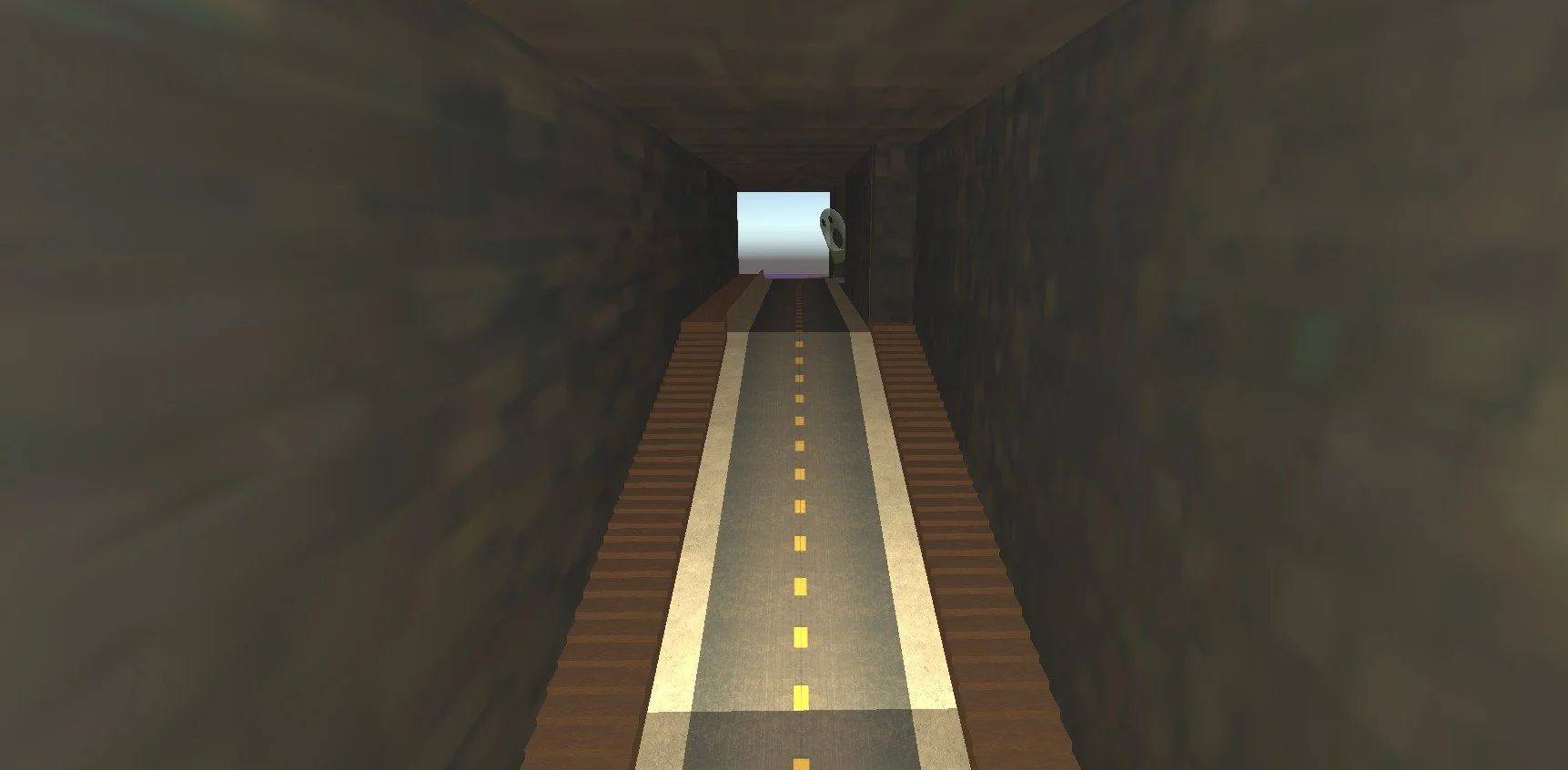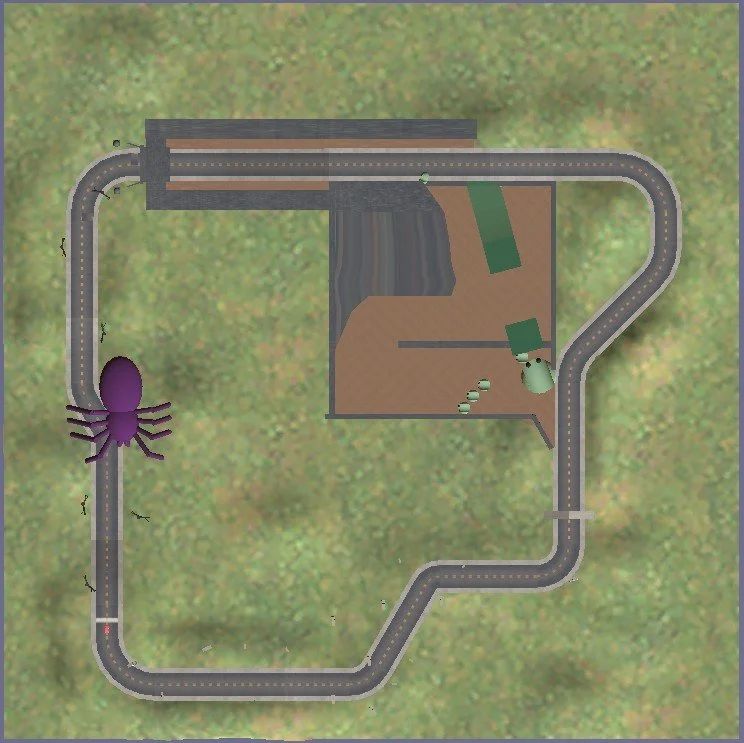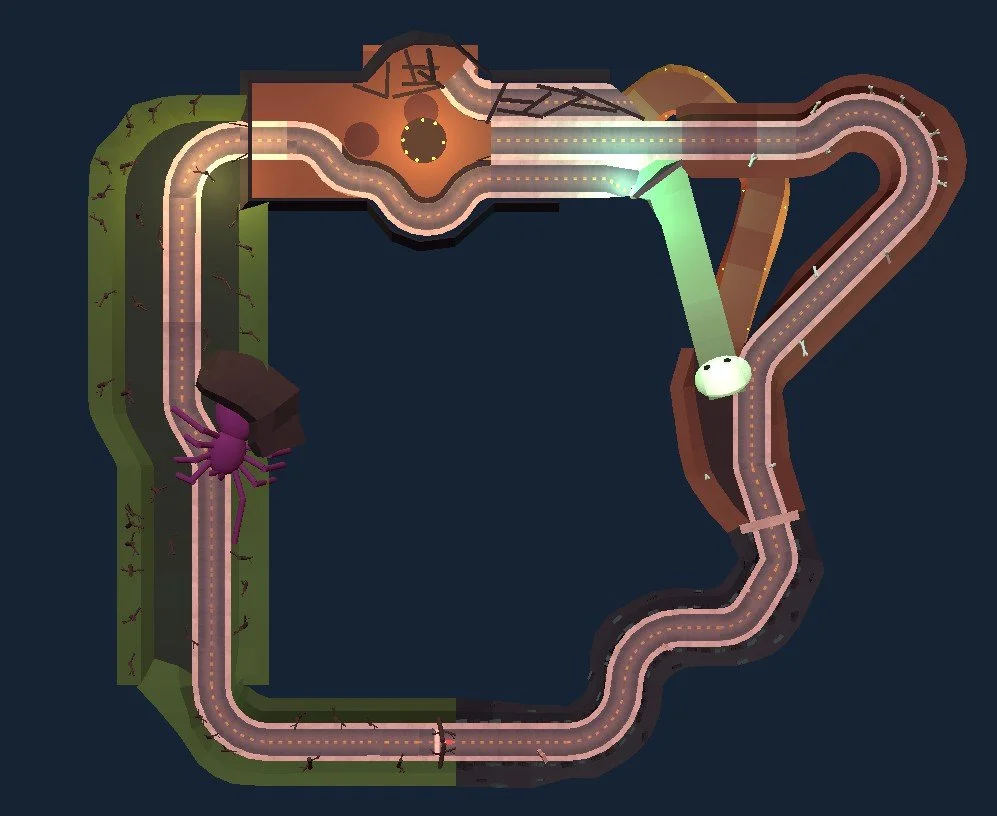Graveyard Shift
Graveyard Shift is a haunted racing level that challenges players with multiple paths and spooky surprises. Racers begin by tearing through a giant spider’s web before entering a creaky mansion and climbing its curved grand staircase. After escaping into a moonlit graveyard, players race uphill past tombstones and ghostly obstacles.
An optional shortcut through the glowing mouth of a ghost offers a risky but rewarding time save. With its eerie atmosphere and layered path design, Graveyard Shift blends horror and speed in a race for the fastest lap.
Engine: Unity
Game Type: Arcade Racer
Personal Project
One-person development team
Roles and Responsibilities
Track Layout & Greyboxing
Designed racetrack layout using modular 50-meter segments to control pacing and readability
Structured layout around fast vehicle movement, ensuring each curve, hill, and straightaway worked with the car’s handling
Greyboxed in-engine to iterate on spacing, visibility, and turn timing with consistent playtesting
Path Design & Player Choice
Developed three distinct traversal routes:
Main Path through the haunted house and the curved staircase
Alternate Path with tighter corners and riskier interior mansion sections
Shortcut through a ghost’s mouth, offering time saved for skilled players
Balanced each path for difficulty, risk, and player flow
Gameplay Flow & Track Rhythm
Tuned verticality and curvature to maintain consistent high-speed traversal
Designed graveyard and mansion segments to create contrast between open sprints and technical corners
Ensured uphill/downhill segments enhanced tension and momentum
Thematic Integration & Environment
Integrated narrative elements like spider web tunnels, creaking staircases, and tomb-filled graveyards
Used haunted visuals and audio cues to reinforce the theme and player orientation
Ensured track readability while preserving eerie atmosphere
Design Documentation
Created a complete Level Design Document (LDD) outlining flow, path structure, and gameplay intent
Included player and object metrics, reference materials, and feature planning to guide the greyboxing and polishing stages
Bubble Diagram of Paths in Graveyard Shift
Pre-Production & Planning
Created a full Level Design Document (LDD) to define goals, flow, and mechanics
Collected visual and gameplay references to establish tone and key landmarks
Built a bubble diagram to map out major areas and path structure (main, alternate, shortcut)TristanHafkenscheid_exe…
Greyboxing & Track Structuring
Designed the track in 50-meter segments to align with fast-paced car movement
Ensured each section supported natural turning, hills, and flow pacing
Initial staircase route was too linear with minimal engagement or variation
Alternate Path Rebuild
Redesigned the staircase into a curved structure for better flow and presence
Added an alternate route underneath the stairs, through a winding, rocky basement
Created tighter corners and route contrast for more technical challenge
Shortcut Redesign
Original shortcut involved a “thread the needle” jump—too punishing and unreliable
Replaced with a raised bridge leading into a ghost’s mouth, improving clarity and risk-reward balance
Preserved spooky visual theme while improving gameplay functionality
Iteration & Playtesting
Conducted multiple playtests to evaluate path balance and traversal flow
Tuned slope angles, turn widths, and timing based on feedback
Final layout delivers three distinct path experiences with speed, skill, and strategy in mind
Level Design Process
Main path ahead with shortcut to the right in a sharp turn
Main path stairs that wind up the mansion
Initial blockout version of staircase in mansion. Felt flat and not like a house.
Refined greybox – curved staircase main path with a alternate path on the first floor.
Grey Boxing and Initial Planning
Development for Graveyard Shift began with a detailed Level Design Document and bubble diagram to map out major landmarks and player flow. The initial greybox used 50-meter modular segments to align track pacing with the car’s fast handling and maintain smooth transitions through turns and hills.
The original staircase was designed as a linear incline, but playtests revealed it lacked challenge and variety. To fix this, I redesigned it into a curved structure, which not only improved the visual layout but allowed for better gameplay flow. This also created space beneath the staircase for a new alternate path—a winding, rocky basement route with tighter corners that offered a more technical challenge.
The shortcut originally required players to precisely jump through a small hole in a wall— a “needle-threading” mechanic that proved too punishing. Worse, it matched the main path’s timing, making it ineffective as a shortcut. I reworked it into a raised bridge that led directly into a ghost’s mouth, improving visual clarity and execution. The shortcut’s entrance was repositioned and iterated on multiple times to ensure it was faster than the main path while still demanding skill to use effectively.







